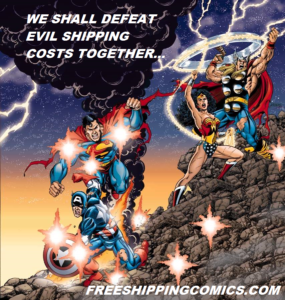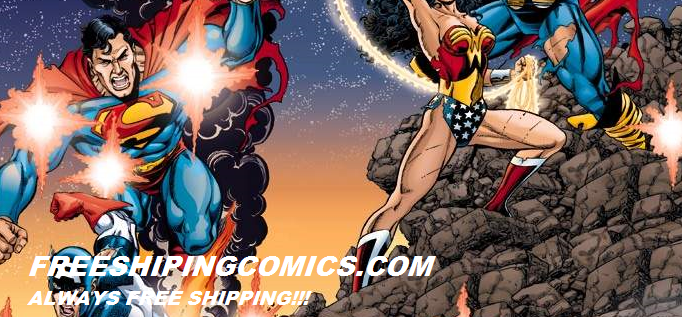Hey comic fans! It’s me, Mikael Page of The Fortress! As if a radio show wasn’t enough, I’ve decided to add to metalmachine.net’s comic content with a regular written article as well. Now I know that no one really reads anymore, so I’ll try to keep this under 140 characters. … What? Already? Well, you’re just going to have to bear with me.
Those of you fans who have been listening to The Fortress regularly (we lovingly refer to you as our Forties) probably have a general sense about my feelings on comic books already. I was not an avid reader of throughout my recent college years, nor did I pick them up right after until I was reengaged by my Fortress colleague (and thrice consecutive winner of the Tristate Annual Nerdgasm Competition) Andrew Sanford. Even so, there were specific titles which paved the way to my renewed appreciation for comics as an adult reader, and which in my mind set the bar for all other comic endeavors.
I’d like everyone to note my refusal to use the term “graphic novel.” I like the colloquial zazz of “comic.” Not only is graphic novel a mouthful, it’s also bland and smacks of overt correctitude. It’s like going out of your way to say Native American instead of Indian. Like we don’t know what you mean. It’s not like they care either. I mean, we gave them casinos, for crying out loud! If they don’t want their casinos, I know we Jews would love to have them! …But I digress.
All that said, there is some validity to the concept behind the term graphic novel, as comics in the modern day should strive to be just that: sophisticated visualizations of powerful narratives with very sympathetic human elements, in the style of the best novels of our history.
Those who listened to the most recent Fortress episode heard my heartfelt and only too short praise for my favorite comic storyline: DC’s Identity Crisis. Just to press a point here which may have been glossed over in that broadcast, that series was largely responsible for dismantling the seemingly idyllic world of DC superheroes, not only because of the death which kicked off a new perception of the heroes’ personal lives, but also because it unveils a dark secret which encompasses years of supervillain conflict and evokes a new shade of moral gray. Seven prominent DC heroes are shown to be holding onto something which, if revealed to the likes of Bats, Supes, or WW, characters whose moral barometers are traditionally more cut and dry, would force the heroes to rethink the way they do business, and the consequences. And, as with the best stories, comic book or otherwise, readers can debate their personal stance for hours.
Regarding this last point, I have found that same strong moral ambiguity in my recent reading of a storyline I just barely missed a few years back: Marvel’s Civil War (I haven’t finished it yet, so don’t give away anything about the ending I don’t already know). CW has easily the most pervasive political content I’ve ever encountered in comics, more than many young readers would likely tolerate, and its level of satire puts it up there with independent superhero lines such as Powers. I certainly know that many invested in this major Marvel event for the sake of seeing heroes beat the crap out of one another. For my part, the political posturing and strong arguments on both sides of superhuman registration are like ice cream and puppies: one tasty meal. I went into Civil War expecting brother turning on brother as if possessed, a simple good v. evil brawl as tradition dictates; and while the authors press the well-documented point that control begets chaos when put in the wrong hands, this is potent, controversial stuff, and I can’t help but admire and shake my head in frustration at characters on both sides of the conflict. Sure, have Cap throw a punch or a shield here and there, but have him wax philosophical for a two-page spread and you’ve got my attention.
Much of the modern, verbose nature of comics, particularly those with the highest critical acclaim, has to do with technology. People wonder why they should look at stills of Iron Man firing off energy beams or of Batman dropping five thugs in one panel when they could just watch it in action on a giant screen, and rightfully so. This is the age of comic book films, with huge budgets, stars and press attention; an age Jack Kirby and Bob Kane could have only dreamed to witness, both having the bad taste and foresight to die over a decade ago. Such advancements in film technology have allowed the medium to surpass mere illustration, the same way it did classic radio shows. Does this make the comic art form irrelevant? No, far from it. As with the adaptations of classic novels into film, certain crucial elements will always fail to make the cut; film, as a predominant form of entertainment, shall continue to suffer major artistic constraints until it itself is replaced by something even more grand (my guess? Holographic sex-bots with feelings). As of right now, comics have a tremendous opportunity to take advantage of its more esoteric status, to produce the most artistically unique and narratively moving work possible.
These recent titles by both DC and Marvel have accomplished this goal with flying colors. They both have much the same thing to offer, though Marvel tends to favor overt political commentary over DC’s iconic social and ideological narrative, as with recent Green Lantern stories. Both are excellent, both are worth your time. Simply demand the most from your favorite authors and artists when it comes to giving the world sympathetic, human heroes, and that’s exactly what you’ll get.


